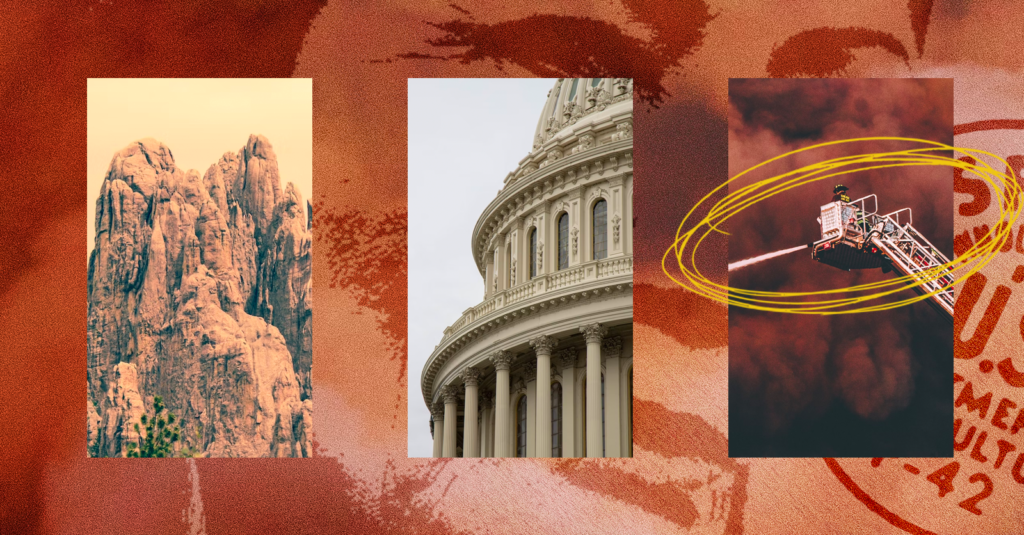
Ahead of the Wildland Fire Commission Report Release, a Roundup of FAS’s Efforts to Provide Input on Wildland Fire Policy
FAS is committed to producing science-based policy recommendations that improve people’s lives – and over the last year we’ve devoted considerable effort to understanding wildfire in the context of U.S. federal policy. We hope that some of our work will be reflected in the forthcoming Congressionally authorized Wildland Fire Mitigation and Management Commission Report, anticipated for release in the coming days.
Over the past year, together with partner organizations COMPASS, Conservation X Labs, and the California Council on Science and Technology, FAS recruited diverse experts to participate in our Wildland Fire Policy Accelerator to develop actionable ideas, presented in a concise format, to inform the work of the Commission.
In early 2023, FAS hosted a convening that provided stakeholders (including Commission members and Accelerator participants) from the science, technology, and policy communities with an opportunity to exchange forward-looking ideas with the shared goal of improving the federal government’s approach to managing wildland fire.
Wildland Fire Policy Accelerator: Developing Actionable Recommendations
Working together, FAS and accelerator participants produced policy recommendations that provide targeted suggestions for addressing wildfire challenges in several domains, including landscapes and communities; public health and infrastructure; science, data, and technology; and the workforce. With climate change worsening wildfire impacts, a holistic overhaul of wildland fire policy is urgent, but also within reach, if policymakers work collaboratively to implement a broad suite of changes.
FAS Wildland Fire Policy Memos
Effective wildfire management will require a thoughtful, multi-pronged approach, as detailed in these memos by Accelerator participants.
- Increasing National Resilience Through An Open Disaster Data Initiative – Lack of complete data down to the granular level makes it challenging to gauge the true cost of disasters, including wildfires, write contributors Shefali Juneja Lakhina, Melanie Gall, and Monica Sanders.
- Next-Generation Fire And Vegetation Modeling For A Hot And Dry Future – Fewer than 2% of ignitions become large wildfires, but it is this 2% that cause most of the damage because they are burning under extreme conditions, writes Matthew Hurteau, who advocates for updating fire models to understand the danger.
- Save Lives By Making Smoke Tracking A Core Part Of Wildland Fire Management – Several federal programs exist to track wildfire smoke nationwide, but there are gaps in their utility as actionable intelligence for health, writes Alistair Hayden.
Wildland Fire in Context: Ensuring Broad Perspectives Are Incorporated
- FAS contributor Liam Torpy (of Conservation X Labs) spoke with Jonathan Wilson of FAS about the benefits of, and renewed attention to, Indigenous methods of fire control known as cultural burning.
- Many Americans don’t appreciate the dangers of wildfires when they aren’t happening in their backyard. Scientists need to refine their communication skills to ensure that policymakers are equipped with the knowledge they need to make decisions. FAS contributor Alex Griffith (of COMPASS) explains one useful tool: the message box.
Funding and Implementation of Wildland Fire Programs: Mapping the Landscape
- Partnering with Resources for the Future (RFF), ecologist Ann Bartuska, FAS team members Alice Wu, Kate Kohn, and I unveiled the Federal Wildfire Funding Wheel to help people visualize where federal dollars are directed in wildland fire management.
- How does the U.S. fund wildland fire management and suppression? FAS Impact Fellow Sonia Wang and Jessica Blackband of FAS explain how agencies fund this work, and what could be improved.
- FAS Impact Fellow Sarah Coefield produced a detailed, one-of-a-kind report on the federal response to smoke, a hugely damaging aspect of wildland fire.
Our wildland fire work is not finished. We look forward to reviewing the policy recommendations of the forthcoming Commission Report and helping to amplify its messages in the halls of Congress and in federal agencies. We applaud the efforts of the Commission to incorporate and synthesize diverse perspectives over an incredibly short time frame and we hope that the report will be as robust and comprehensive as is required to improve how we live with wildland fire. Our staff, partners, and engaged subject matter experts, and others are sure to have thoughts, which we look forward to sharing in the coming weeks. Stay tuned.
FAS is launching the Center for Regulatory Ingenuity (CRI) to build a new, transpartisan vision of government that works – that has the capacity to achieve ambitious goals while adeptly responding to people’s basic needs.
This runs counter to public opinion: 4 in 5 of all Americans, across party lines, want to see the government take stronger climate action.
Cities need to rapidly become compact, efficient, electrified, and nature‑rich urban ecosystems where we take better care of each other and avoid locking in more sprawl and fossil‑fuel dependence.
Hurricanes cause around 24 deaths per storm – but the longer-term consequences kill thousands more. With extreme weather events becoming ever-more common, there is a national and moral imperative to rethink not just who responds to disasters, but for how long and to what end.